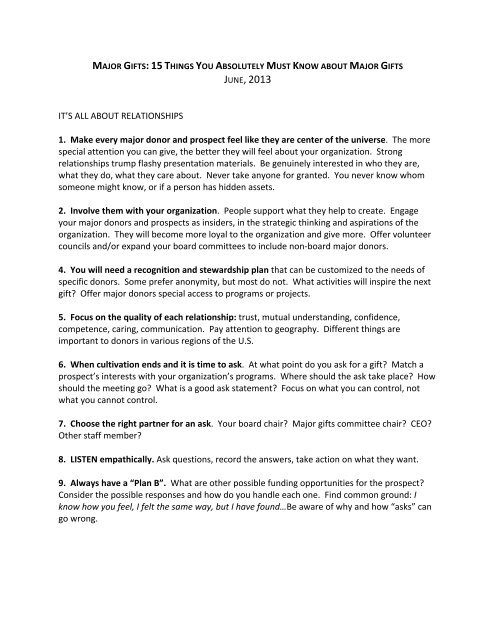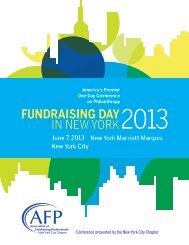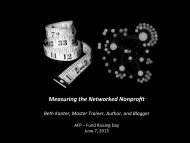15 Things You Absolutely Must Know (handout)
15 Things You Absolutely Must Know (handout)
15 Things You Absolutely Must Know (handout)
Create successful ePaper yourself
Turn your PDF publications into a flip-book with our unique Google optimized e-Paper software.
MAJOR GIFTS: <strong>15</strong> THINGS YOU ABSOLUTELY MUST KNOW ABOUT MAJOR GIFTS <br />
JUNE, 2013 <br />
IT’S ALL ABOUT RELATIONSHIPS <br />
1. Make every major donor and prospect feel like they are center of the universe. The more <br />
special attention you can give, the better they will feel about your organization. Strong <br />
relationships trump flashy presentation materials. Be genuinely interested in who they are, <br />
what they do, what they care about. Never take anyone for granted. <strong>You</strong> never know whom <br />
someone might know, or if a person has hidden assets. <br />
2. Involve them with your organization. People support what they help to create. Engage <br />
your major donors and prospects as insiders, in the strategic thinking and aspirations of the <br />
organization. They will become more loyal to the organization and give more. Offer volunteer <br />
councils and/or expand your board committees to include non-‐board major donors. <br />
4. <strong>You</strong> will need a recognition and stewardship plan that can be customized to the needs of <br />
specific donors. Some prefer anonymity, but most do not. What activities will inspire the next <br />
gift Offer major donors special access to programs or projects. <br />
5. Focus on the quality of each relationship: trust, mutual understanding, confidence, <br />
competence, caring, communication. Pay attention to geography. Different things are <br />
important to donors in various regions of the U.S. <br />
6. When cultivation ends and it is time to ask. At what point do you ask for a gift Match a <br />
prospect’s interests with your organization’s programs. Where should the ask take place How <br />
should the meeting go What is a good ask statement Focus on what you can control, not <br />
what you cannot control. <br />
7. Choose the right partner for an ask. <strong>You</strong>r board chair Major gifts committee chair CEO <br />
Other staff member <br />
8. LISTEN empathically. Ask questions, record the answers, take action on what they want. <br />
9. Always have a “Plan B”. What are other possible funding opportunities for the prospect <br />
Consider the possible responses and how do you handle each one. Find common ground: I <br />
know how you feel, I felt the same way, but I have found…Be aware of why and how “asks” can <br />
go wrong.
IT’S ALL ABOUT LEADERSHIP <br />
10. <strong>You</strong> can’t do it alone; active engagement of the CEO and the Board of Directors is critical. <br />
Engage board members in cultivation events/visits and solicitation meetings. Give volunteer <br />
leaders the opportunity to show their dedication and commitment to the organization, and to <br />
provide an alternative viewpoint. Form a Major Gifts Committee. Read Rosie’s Rules by John <br />
Rosenwald: http://www.nytimes.com/2000/11/20/giving/when-‐rosie-‐asks-‐new-‐york-‐s-‐elite-can-‐t-‐say-‐no.htmlpagewanted=all&src=pm<br />
<br />
IT’S ALL ABOUT THE ORGANIZATION <br />
11. <strong>Know</strong> your case for support. <strong>Know</strong> your two-‐minute pitch and paint the bigger picture. <br />
Present your organization’s mission and programs; its revenue and expenses; its goals for the <br />
year; its vision for the next five years. <strong>Know</strong> what distinguishes your organization from others. <br />
Report on tangible results/outcomes often and with meaning. <br />
12. Build a strong, diverse major gifts culture in your organization. Everyone in your <br />
organization is a fundraiser. Conduct a fundraising training not only for your board but also for <br />
every staff member in your organization. Advise on how to talk about your organization, and to <br />
think about whom they know who would be interested. Recruit a diverse staff and board to <br />
reach diverse donors. <br />
13. Manage your major gifts plan and yourself. Implement your team plan and your personal <br />
plan. <strong>Know</strong> the work habits of top-‐performers. Have a good system. Create a funnel for <br />
donors to become major donors. <strong>Know</strong> Thy Donor. Research, research, research and show <br />
them you know them. Think birthday cards, anniversary cards, etc. Send notes of <br />
congratulations when they are in the news. <br />
14. Leverage your website. Include a major donor section on your website where only they <br />
can access exclusive information, webcasts, photos, etc. Let them also create their own pages <br />
as testimonials. <br />
<strong>15</strong>. Have fun. It's contagious. If for example your events are fun, your major donors will bring <br />
friends. <br />
FRDNY 2013 Major Gifts Track Chairs: <br />
Patricia Caesar, Caesar Consulting, Inc. and Linda C. Hartley, Hartley Consulting, Inc. <br />
Major Gifts Session # 1 Participants: <br />
Rich Brown, NYU George H. Heyman Jr. Center for Philanthropy and Fundraising; Nina <br />
Diefenbach, Metropolitan Museum of Art; Alesia Soltanpanah, Ms. Foundation for Women <br />
We thank the New York University George H. Heyman, Jr. Center for Philanthropy and <br />
Fundraising for sponsoring the Major Gifts Track at Fundraising Day in New York 2013.





